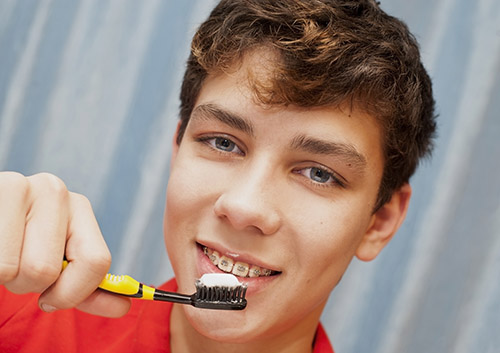Start Your Day Off with a (Healthy) Smile!
February 1st, 2023

If there’s one meal that can claim the title of “Sweetest Meal of the Day,” it’s almost certainly breakfast. Sugary cereals, syrup-covered waffles, oatmeal with honey, cinnamon toast (which is literally sugar poured on toast)—it’s hard to imagine another menu even coming close. But you’re trying to keep your diet as healthy as possible. What to do?
First, no need to deprive yourself of the occasional pastry or stack of pancakes. The real problem with breakfast isn’t so much sugar as it is added sugar.
- Just a Spoonful of Sugar? What’s So Bad About That?
Nothing! Many healthy foods have natural sugars. Milk contains lactose sugar, and it also contains calcium and is enriched with vitamin D—both of which are essential for strong bones and teeth. Fruits get their sweetness from a sugar called fructose, and deliciously provide vitamins, minerals, antioxidants, and fiber to our diets.
Even processed sugar is surprisingly low in calories. In fact, a teaspoon of white sugar has only about 15 calories. But this teaspoon is also rich in nutrients for cavity-causing bacteria. The oral bacteria in plaque use sugars and carbohydrates from food particles as a fuel source to produce acids. These acids erode enamel and lead to cavities.
Choosing breakfast foods without additional sugars, then, is an easy way to reduce the number of empty calories in your diet while safeguarding the health of your teeth. We have a few suggestions.
- Be Selective with Cereals
If the word “sugar” or “honey” or appears on the box, that’s a hint that your favorite cereal is heavy on the sugar. But there’s a more scientific way to tell just how much sugar is in that spoonful.
While the colorful packaging and playful mascots are eye-catching, check the black-and-white panel with nutritional facts found on every box. If one serving equals 27 grams, and the sugar in that serving equals 15 grams, you know you have a problem. And cereals marketed to children are especially “rich” in added sugar.
But luckily, you don’t need to give up your morning bowl. Many cold cereals are available that offer whole grains, protein, and fiber without a lot of added sugar. Spend some time in the cereal aisle comparing, or, to make life easier, there are many online sites which recommend the best (and worst) cereals in terms of sugar content.
- Use Your Judgment with Juices
Fruits are packed with important nutrients. Not only do they provide essential vitamins and minerals, they’re a great source of water and fiber. If you drink 100% fruit juice, you are getting the benefit of most of the vitamins and minerals found in fruit. (You’re also getting less of the fruit’s natural fiber, and more of the fruit’s natural sugar, so consider fresh fruit as an option occasionally.)
But when fruit juice comes with “cocktail,” or “punch,” or “ade” attached to the end of it, there’s often something else attached—added sugar. For natural fruit flavor and the least amount of sugar, stay with 100% unsweetened fruit juice.
- Search Out “Surprise” Sugars
Remember the childhood excitement of searching through your cereal box for the prize inside? Fun! What’s not so much fun? The surprises you might find when you search through the labels on your favorite breakfast items—because added sugars make their stealthy way into many of our morning favorites.
When you compare plain, Greek, and low-fat yogurts, for example, the low-fat options are often higher in added sugar. A container of low-fat yogurt can provide 19 grams of sugar—that’s a tablespoon and a half!
And while you’re at it, be sure to compare the sugar content in granola bars. Some are full of nuts and grains, and some are full of added sugar.
Going out for a breakfast smoothie? Those can contain 70 grams of sugar and more. Making your own at home might be a little more time-consuming, but if you use fresh fruit as your sweetener, you can make sure that what you’re not consuming is added sugar. If you’re on the go, check out all-fruit options at your favorite smoothie shop.
Dr. Ford and Dr. Guter and our team aren’t asking you to eliminate sugar from your breakfast diet altogether. (Everyone loves a doughnut now and again.) But substituting some alternatives for your regular menu choices can reduce the amount of added sugars by tablespoons every meal. That’s another great reason to greet the morning with a smile!





 Website Powered by Sesame 24-7™
Website Powered by Sesame 24-7™